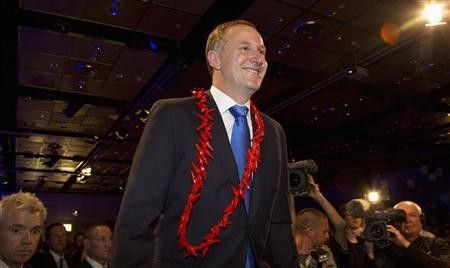John Key Gov't Retracts From The Promise Of New Zealand Budget Surplus ThIs Year: New Update Shows Deficit Due To Falling Dairy Prices

The much awaited New Zealand budget surplus for this year turned into a chimera with the government using falling dairy prices as an alibi to work out a budget deficit. Accordingly, New Zealand's Treasury department said on Wednesday that the budget will remain in deficit this year too, because of crashing commodity prices and weaker inflation, which are curbing tax revenue. The government's pledge to deliver the first surplus in seven years was awaited with much anticipation.
Still, the government confirmed that conditions are ripe to turn in a surplus, despite the small deficit it is presenting now. As per the new projections, the operating deficit will be NZ$572 million, which is equivalent to US$443 million, in the 12 months through June 2015. This half-year economic and fiscal update contrasts with the August 2014 projection of a NZ$297 million surplus.
Finance Minister Bill English made some conciliatory remarks aimed at the surplus hopefuls and said solid economic growth and controlled spending would lead to a surplus when the final accounts will be published in October 2015, reported Radio Nz.
Modified Forecasts
As per the modified forcasts, the budget will show a surplus of NZ$565 million in 2015-16 against the NZ$818 million surplus projected in August. The surplus is expected to widen to NZ$2.6 billion a year later. The government said the fall in dairy prices was more than it expected and seriously curbed the farm incomes, which are providing less support to growth, reported Bloomberg.
The Treasury also predicted that the economy will grow an average 2.8 percent over the next five years, driven by the rebuilding of Christchurch and construction in Auckland, rising immigration and commodity prices. Concerns persist on the possible decline in dairy and log prices and weaker demand from China. This will impede the previously projected growth rates. The economy is expected to peak at 3.5 percent in the March 2015 year, compared to 3.8 percent in August update, before it plateaus to 3.4 percent and 2.8 percent in the 2016 and 2017 years respectively, and 2.3 percent and 2.2 percent in the two years after that.
Political Setback
Politically, this is a setback for Prime Minister John Key who won the election for a third term in September, pledging a return to surplus this year and liberal tax cuts in 2017. The government seems to be going back on its word, at a time the economy is being buoyed by record immigration and construction. The only drag to showcase is the plunging prices of dairy products, which is New Zealand's biggest export.
The Labour Party said the government owes an apology to New Zealanders for failing to deliver the surplus it promised. Finance spokesperson Grant Robertson said the surplus was the political totem pole which Finance minister English and Prime Minister John Key set up for themselves, and it has now fallen over.





















